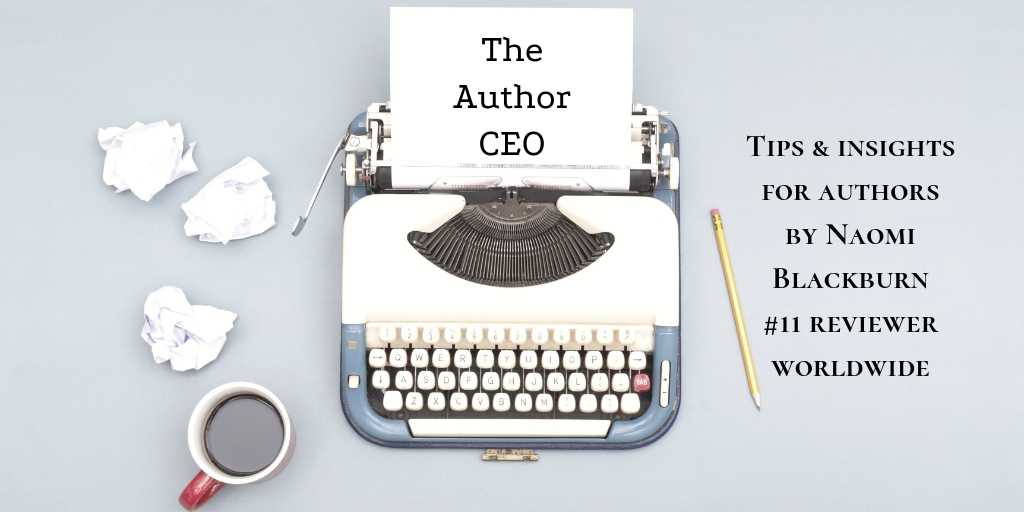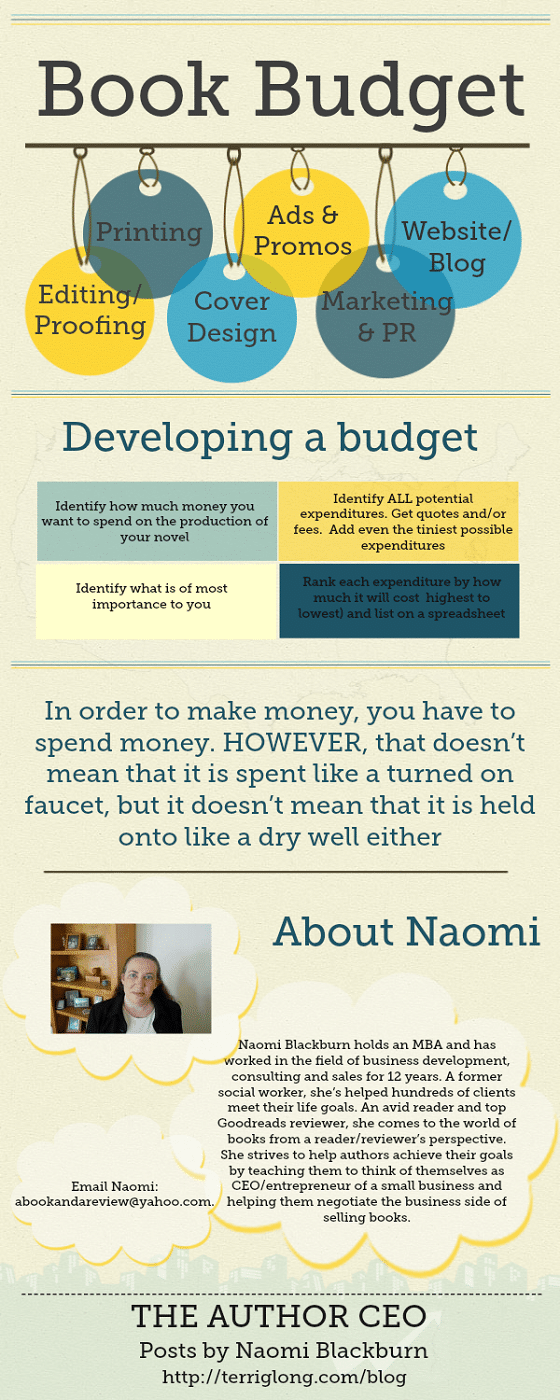This week Naomi Blackburn shares great advice about the things you should be sure not to overlook when drawing up a budget for your book. Find out more from our Author CEO…
Naomi is founder of the Goodreads group Sisterhood of the Traveling Books, as well as the Nordic Noir group, dedicated to discussing Scandinavian mysteries. This year, Goodreads ranked her at # 11 on their top reviewer list, in both the U.S. and in the world (2011 rankings). As a reviewer, Naomi is brilliant, insightful, and, as she puts it, “brutally honest.”
Please feel free to leave questions for Naomi, as well as any suggestions you may have for future posts. I hope you enjoy the column!
The Author CEO: Developing a Budget for Your Book
by Naomi Blackburn
So, a book is in progress and you are in the process of developing a budget or evaluating one already in place: good for you!
A budget is of vital importance to any business and your book is no different. A budget helps you stay on track moneywise and helps to curb any frivolous spending which may pop up.
Key expenditures for your book to investigate include:
- Proofreading fees
- Editor
- Printing
- Cover Designers
- Charged Reviews, such as Kirkus
- Marketing
- Advertising
- Website Development
- PR Firms
When developing a budget, I utilize the following steps:
1) Identify how much money you want to spend on the production of your novel.
2) Identify ALL potential expenditures. Get quotes and/or fees. Add even the tiniest possible expenditures, even those $20 blog ads: those $20 charges add up quickly! Remember, things can be removed at a later time, but it gets confusing and disorganized if they are added on at a later time. Set aside some cash for those things that pop up: and they will.
3) Next, rank them in order of importance. Identify what is of most importance to you.
4) Then, identify what expenditures can be done in order of importance from high to low with a cheaper or no cost manner given a lower number and those which require outside resources a higher number.
5) Transfer to a data sheet, such as Excel. I always place those expenditures that have high numbers on both lists at the top of my budget and then continue on in descending order.
For example, is hiring an editor a top need for you, but investigating marketing of your book, you determine it can be done cheaper with all or part of it being done by you? Then, fees for editing services would be on the top of your budget, while marketing would be at the bottom. Maybe you decided that you don’t need editing services or a proofreader and/or friends, family or other sources are going to be beta readers for your book, but you are uncomfortable with marketing. Then, you might want to list marketing/advertising professionals at the top of your budget.
It will be imperative to really take a deep look at options that you have for saving costs. Setting up a website for your book is imperative, but do you do it yourself or bring in a firm which can charge thousands of dollars or do you do it yourself? How about editing your book? Are there cheaper ways to get it proof read? I can’t say this enough: what and where you are comfortable with is going to be of key importance and you need to take a deep, honest look within yourself as to your strengths and weaknesses on the production side of bringing your book to market.
One issue that novelists need to think about that those of us who budget in the corporate world don’t need to think about is: are you going to reinvest your profits back into your book’s marketing plan or are you going to use it to live on? It is better to have this question thought out and committed to before than when profits begin to come in. That way temptation doesn’t try to sway you if you took a sabbatical to write your book and need money to live on or if you get your first check and a new purse or pair of shoes keeps calling your name.
Most people don’t have oodles and oodles of money to spend on the production and marketing of their book. Going the Indie/SP route, instead of the traditional publishing route, means not only do you, as the writer, need to develop a business plan, but the money necessary to implement it. With numerous vendors and opportunities to spend money, it is imperative, therefore, that money be spent smartly, utilizing cash be reserved for tasks that the author cannot do themselves.
I have said this multiple times and I firmly believe that in order to make money, you have to spend money. HOWEVER, that doesn’t mean that it is spent like a turned on faucet, but it doesn’t mean that it is held onto like a dry well either.
About Naomi Blackburn
Naomi Blackburn holds an MBA and has worked in the field of business development, consulting and sales for 12 years. A former social worker, she’s helped hundreds of clients meet their life goals. An avid reader and top Goodreads reviewer, she comes to the world of books from a reader/reviewer’s perspective. She strives to help authors achieve their goals by teaching them to think of themselves as CEO/entrepreneur of a small business and helping them negotiate the business side of selling books.
Related Posts
- More than Magic and Me: The Hidden Costs of Self Publishing
- The Publicity Hound’s Blog: 6 biggest mistakes of self-published authors
- Carte Blanche by Amelia Curzon: Before you self-publish, count the cost!





I'd love to hear your thoughts!